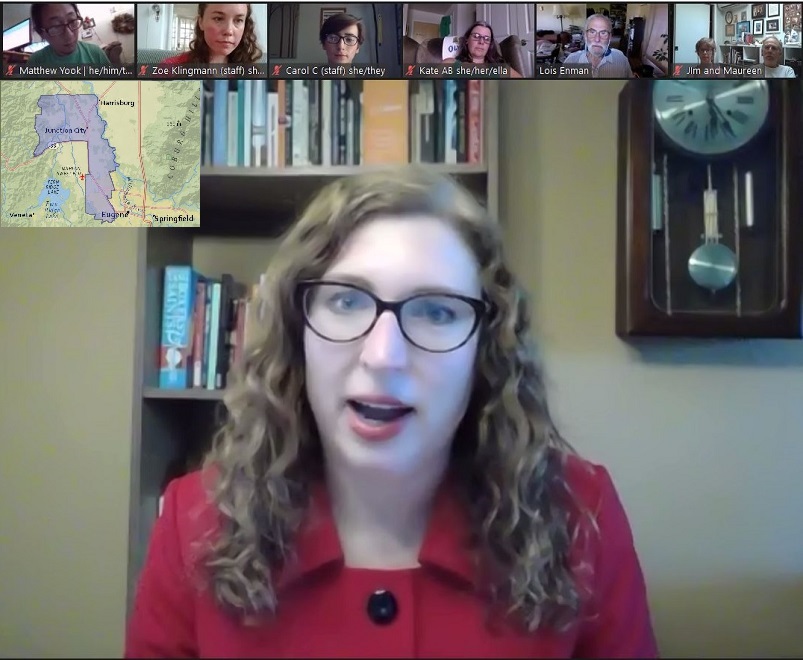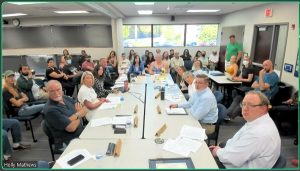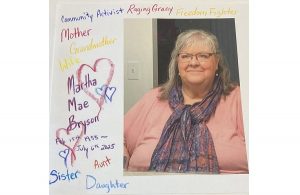House District 14 Report: Rep. Julie Fahey recaps 2021 session
8 min read
Rep. Julie Fahey, Chair of the House Committee on Housing, recapped the 2021 legislature session.
Rep. Julie Fahey: [00:00:00] We’ve had a preexisting housing crisis in this state for years. We are over 100,000 housing units short to meet the need that exists right now. So many people are struggling to find an affordable place to live.
Rep. Julie Fahey served as chair of the Housing Committee, and had a lot to report to constituents.
Rep. Julie Fahey: [00:00:18] I was the chair of the Housing Committee, a busy session for me. The big thing to note on housing is that there’s both policy and there’s investments in housing.
And on the investment side, we were able to spend over $765 million on affordable housing construction, rebuilding wildfire-impacted communities, starting a new program for healthy home repairs for low-income Oregonians, fair housing endorsement and a variety of other things. So my hope is that substantial investment will help us make the dent in housing supply, particularly for affordable housing for lower income Oregonians.
We also had some major investments in policy changes in the areas of homelessness tenant support, home ownership, and housing supply.
So on the homelessness front, how I think about homelessness is that there are many reasons why people become unhoused. And so you think about what are the root causes of some of those things. And so I was particularly excited this session we were able to make that major housing investment in order to help with one of the root causes of homelessness, which is housing crisis are too high rent and other prices.
Thank you for supporting
local citizen journalism
The other root cause, in my opinion, is the fact that we’ve disinvested from our behavioral and mental health care system for the last many decades here in Oregon. And we were able to make a significant investment package in behavioral health this session— $350 million for substance use treatment and recovery building of treatment facilities, community-based treatment facilities developing our workforce because building facilities doesn’t matter if you don’t have people to work in them. Encouraging more people and having training opportunities for people to get into that industry and to have a appropriately diverse population in that workforce and different services that will be provided for folks who are experiencing mental health, real health crises.
So then I think as a major aspect of homelessness we invested in emergency shelter capacity and navigation centers for around the state in a variety of different communities: Eugene, Salem, Bend, Medford, McMinnville. Roseburg, The Dalles. So in Eugene, we had $5 million for a navigation center, which is the place where people can come to get shelter, but also to help connect them to the services that might put them on a path out of homelessness.
So I think both of those things are important, immediate shelter, and what can we do to put this person on the path out of homelessness? And we also give funding to the communities that help with the operation of shelters and permanent supportive housing in a variety of communities.
So there was a significant amount done on the homelessness front this session, both in terms of immediately helping the folks who are currently unhoused and then trying to address some of the root causes that exist in this state.
On tenant support, the big things that we did there surrounded trying to keep people housed during the pandemic. Governor Brown last year in April started an eviction moratorium, which the legislature then codified into state law through a couple of special sessions last year. We also allocated a record amount of money for rental assistance to help both tenants and landlords. We started a landlord compensation fund at the end of last year that landlords could apply on behalf of all of their tenants’ back rent.
And then through the federal investments, we will have about half a billion dollars coming to the state of Oregon for rental assistance for tenants. In my mind, that’s anything related to the eviction moratorium or eviction protections for tenants, those need to be paired with financial assistance for both tenants and landlords, because the eviction moratorium alone doesn’t fix the issue. There has to be financial assistance as well.
So the state level of eviction moratorium expired at the end of June. So that means tenants right now have to pay rent on an ongoing basis. They have to pay August rent, September rent, et cetera, in order to avoid possible eviction. But the legislature did pass a bill in the session this year, which says the tenants have until the end of February of next February to pay any rent on the back rent that they accrued between April of last year and June of this year. And the purpose of that is that we have all of this federal money that is coming for emergency rental assistance. The state in this first round of federal money, we have $204 million, but we are in the process of getting out the door right now. In some localities, including Lane County also got their own separate allocation.
And so we have the financial resources to keep people housed and to make landlords whole. And so it really didn’t make sense from a public policy perspective to enable evictions to happen when we have the funding to make everyone whole. And so that, that piece was put in place to give us some time to distribute the rent assistant installers. People do have to pay rent on an ongoing basis, but we’ve got really until the end of February to help them make everybody whole on the back rent that they’ve accrued.
The other main protection that’s in place right now is a way to help encourage more people to apply for rental assistance and to increase the awareness that it’s out there, which is what I call a 60 day pause on evictions. If I’m a tenant and I have applied for rental assistance, but I haven’t yet heard back, if you provide proof to your landlord that you have applied for rental assistance then that provides a 60 day pause on any eviction proceedings or the landlord can file for an eviction proceeding in court. And if they have filed,the case gets paused for 60 days. And that’s to give the time for that application to be processed and the money to be paid, that doesn’t apply to evictions for cause obviously, which have been able to happen all along. If you’ve violated your lease or, done other things, but for evictions, for non-payments, there are still protections available.
On the homeownership front, we also passed a foreclosure moratorium for folks who you know, are residing in their homes or who have a small number of rental units. So that can help those landlords as well. We made some significant investments for down payment assistance for first time home buyers to help people become home buyers in this environment.
As I mentioned, we created this healthy homes program for low-income Oregonians to be able to make energy efficiency and weatherization repairs to their homes.
And a fair amount of support for mobile home park residents. The district that I represent, House District 14, is West Eugene and Junction City, and we have one of the most number of people living in mobile home parks of any of the legislative districts in the entire state. So I have been working on mobile home park issues since I came into the legislature. This session was able to pass a bill that strengthened the law that allows tenants to come together and purchase their park and run it as a co-op. So that was a really big challenging bill to pass, but it passed. And so it should make it easier for folks who want to come together and buy their own parks to do.
We also allocated some funding to help people who are in that situation, the sort of high profile— you might’ve remembered The Patrician in Springfield, which is not in my district, but they had a pretty high profile situation with their park and they were able to finally come together and purchase it as residents. So that was a great success story.
John Q: [00:07:07] She also took a question about Critical Race Theory.
Rep. Julie Fahey: [00:07:10] I think that the discussion around critical race theory is an interesting one, because I think when you take a look at what critical race theory actually is, that those three words, it is actually like a real theory that’s not taught in K-12, it’s a legal framework that is taught in law schools. So that students can understand how systemic racism is embedded in our legal systems. So from a, from a. Is critical race theory being taught in our K-12 or pre-K 12 school system. No, the answer is no, that is a very specific legal theory, academic that is pot in an academic postgraduate kind of level.
But what I think has happened in some of the discourse around that topic is.
The word, the phrase, critical race theory has been a substitute for anytime we talk about race. While I don’t know that it’s an issue that critical race theory, specifically being taught in K-12, but what is being taught in K-12 and what I do is that, for example, I work in the housing world, right?
And you go back not that long ago. And there was redlining, which was a very specific way that people of color were not able to access the financial means to buy a home. There were racially restrictive covenants in deeds. There’s one in my home that says my home was built in the early fifties. And in the deed, it says that only people of the Caucasian race can live in this home unless they are servants. That cook provision is unenforceable.
It’s the fair housing act made it illegal, but it’s still there. So do I think that that might be an appropriate topic for a junior or senior in high school to learn about housing and the discrimination that happened in the past? Yeah, I think it’s a good idea for our kids to know about at an age appropriate way, just the facts of our history and how that impacts things today,
On the housing front , it wasn’t that long ago, that those things happened that still impact people’s access to housing today, whether their families were able to build generational wealth, those types of things.
Taking a look at what our history was, what happened, what did we do with the trail of tears, with slavery and the civil war and reconstruction after the civil war, I think you need to talk about race, to be able to understand what happened and how that may impact things today.
So that’s my answer to that as well. Your, strict question of, is critical race theory being taught in our schools? No, but is our children learning about race and our country’s history and how that impacts today, I absolutely would think that’s appropriate for kids to learn that.



